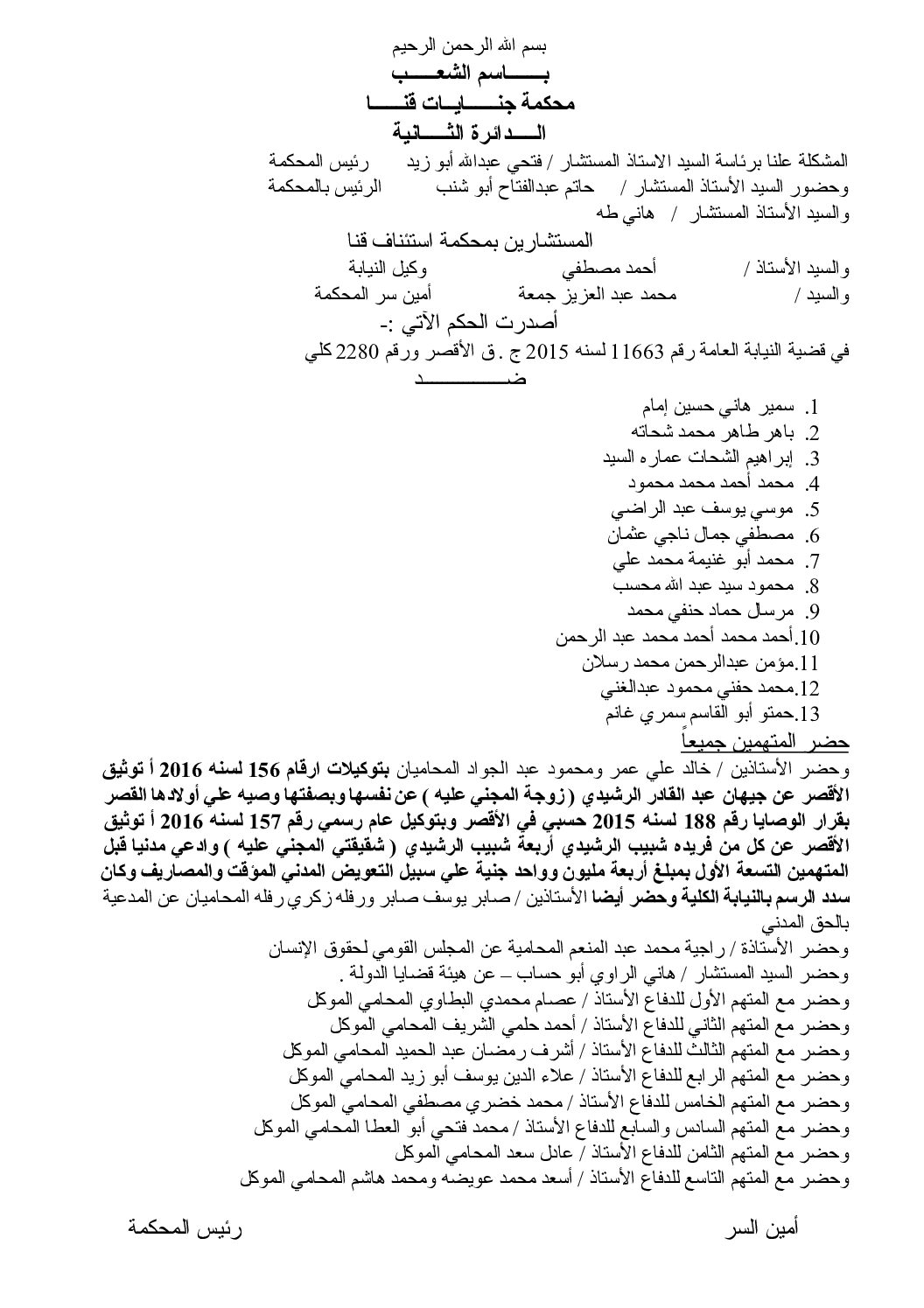The Latest on “Coal”: Continuing of Struggle

It has become clear that political elites and business tycoons have united to put Egypt on a toxic path, with an environment minister encouraging the use of coal, the Government is doing away with the future generation’s rights’ to live in a healthy environment, working against all that constitutes economic, scientific, or political sense for the future of Egypt. Despite the ongoing struggle of Egyptian civil society groups, official syndicates, social, health and environment stakeholders
The Case
The last hope now lies in the hands of the Judiciary. The case contesting the Cabinet decision on coal was filed by ECESR at the beginning of 2014. After three hearings under Judge Hassouna Tawfiq stepped down on the June 7th, citing “Unease and discomfiture”. ECESR deduces pressures were exerted over him to rule a certain way. The case was assigned to a new judicial circuit and postponed to November, in order “to sufficiently assess the evidence” ECESR submitted.
Thus so far there has been no Cabinet decision that is recognized legally, the “decision” only constitutes an announcement. This is the basis of the ECESR case filed against the Government. Arguing that if the announcement is considered a “decision” it is illegal on the basis of harm to Egyptian citizens; and if it is not a decision legally then coal should not be being imported at the first place, it is still illegal under current environmental laws of Egypt.
The Government, The Business
Meanwhile, Consecutive Cabinets’ position on the issue have been increasingly worrisome, bowing to lobbying from an industry monopoly with majority non-Egyptian ownership and huge profit margins. Despite the issue being contested before Courts since February 2014, Mehleb illegally allowed cement factories to import coal since April 2014, despite current environmental laws of Egypt which prohibit importing and use of coal and without waiting for the “EU-style regulations” the Minister of Environmental Affairs was asked to compile. Media reports found that the Minister’s initial amendments for regulation of coal were dismissed as “too stringent”, the Cabinet asking her to water down the regulations, demonstrating lack of intent to commit to real safeguards.
Whilst the world moves away from coal for its cement industries, increasingly replacing it with Waste Derived Fuels (WDF), business, and more specifically the cement industry in Egypt, have secured coal as its primary source of energy in an expensive and destructive step backwards
International Players
At the same time, foreign governmental and non-governmental investors began to pledge large sums of money for coal projects since January 2014. On March 20th 2014, the Italian Embassy announced a government grant of $1.3billion for “energy and infrastructure projects” in Egypt. Although it does not explicitly state an intent to fund coal, it is likely that it will be used for this, especially as Italcementi – a major Italian cement business – reported that Egypt was its largest profit earner in 2009.
The European Bank for Reconstruction and Development (EBRD) indicated since its December 2013 deliberations with Munir Fakhri AbdelNoor, (Minister of Industry, Investment and Trade) that it intends to fund the cement industry’s gas to coal to switch in the form of loans, despite ECESR’s correspondence with the Bank and the efforts of tens of environmental organization, social movements, and professional syndicates, which have submitted evidence on why it shouldn’t.
Such “foreign investor” interest in financing coal raises questions and deep concerns about the role of International and EU based development finance institutions in Egypt’s transition. They seem to be promoting “business as usual” through their investments, extending Mubarak’s corrupt legacy, and working against the realization of the people’s struggle after 2011 Revolution.
The Industry
Mehleb’s green-light to cement industry has initiated a race to import and use coal irrespective of the absence of the promised regulations; in June truck-loads of coal were delivered to Lafarge Ein Sokhna, and 2 Italcementi cement factories. The EEAA confiscated the deliveries however no legal action was taken against those responsible for the violations. This lack of enforcement of the rule of law has clearly given the industry a false sense of security as 76,000 tonnes of coal destined for cement factories were delivered into Alexandria port this month and the River Transport Authority publicly announced it had transported 60,000 tonnes of coal for cement plants down the Nile in the last four months.
Furthermore, factories are publicly reporting that they are “testing coal” and sources inside the cement industry are saying that Lafarge and Arabian Cement plants have been using coal for the last two weeks. The lack of transparency as to the implementation of the Government’s policy is making it hard for civil society to act as an oversight mechanism on a policy that is highly destructive to the personal, social, economic and environmental rights of Egyptians.
Rule Of Law; The Continuing Struggle
Finally, the new Cabinet’s position is ignoring all public concern and ongoing legal disputes. Khaled Fahmy was reinstated as Minister of Environmental Affairs and within one week Fahmy announced his top priority to be introducing “clean coal” to Egypt. With the EEAA representing the main blockage in legalizing coal in Egypt, his appointment paves the way for political consensus on coal.
ECESR calls upon the cabinet and the executive to put an end to these violations and bending of the rule of law to respect the next generations rights to a sustainable environment to realise the aspirations of a population. especially the poor and marginalised, who already feel the worst effects of unregulated pollution of profitable industry in Egypt; adding to their burden with coal pollution will only serve to increase the burden on their ability to survive as well as the pressures on public services like the health system. This will not be tolerated by Egyptians of current or future generations.

